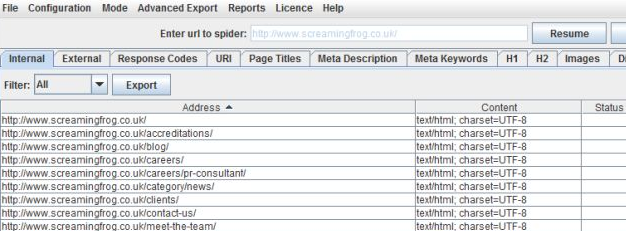

- Screaming frog seo spider logo full#
- Screaming frog seo spider logo professional#
- Screaming frog seo spider logo free#
Anyone who says Excel is not a core SEO tool isn’t deeply invested in data-driven decision making. Ahrefs and SEMrush are the more full-featured and higher priced alternatives, offering many more features and a slicker interface.

Google Search Console also offers backlink data for Google for free. The cost ranges from tens of dollars per month to hundreds. Majestic is the most frequently used standalone backlink tool, with supposedly the largest link index in the world. They can also help determine which links to your site are doing more harm than good, and whether you have been the victim of a negative backlink campaign. These tools identify the links to your site and, also, links to your competitors’ sites, which you may want to woo. Links to your website are the lifeblood of natural search performance. It’s a good place to start.ĭeepCrawl is more expensive - hundreds of dollars per month depending on the subscription type - but it packs additional features like backlinks and site architecture analysis.īacklink tools.
Screaming frog seo spider logo full#
The full version, for unlimited crawls, is £149 per year.
Screaming frog seo spider logo free#
Screaming Frog offers a free version that crawls up to 500 pages at a time. The top two names in crawlers for SEO purposes are Screaming Frog’s SEO Spider and DeepCrawl. Use it to find errors, check for duplicate title tags, test a new site launch, create an XML sitemap, and much more. To understand how search engine spiders encounter the basic meta elements of your site, you’ll need a crawler. Don’t forget, though, that Google Search Console offers rankings data for Google search results for free.

The best rankings trackers are part of larger SEO platforms or bundled with broader tools like SEMrush and Ahrefs. It’s hard to find a standalone tool that only tracks rankings. All are subscription-based and range from tens to hundreds of dollars monthly. If you don’t have access to an actively bidding AdWords account, try one of the other keyword tools, such as Wordstream, SEMrush, and Ahrefs. There’s no cost beyond what you already spend on AdWords. If your company runs AdWords campaigns, access that account to use the keyword planner. Unless you’re in an account that runs a campaign above a minimum threshold in spend, today’s Keyword Planner provides only data ranges for keyword values instead of actual rounded numbers, making finer optimization decisions very difficult. Google AdWords Keyword Planner is still the go-to source for keyword data, though the SEO community is increasingly ambivalent about it. They enable the two largest search engines to send you messages regarding issues on your site that impact your rankings.

They give access to performance data that can’t be acquired from any other source. Google Search Console and Bing Webmaster Tools should likewise be cornerstones in your SEO toolbox. But they’re a favorite of SEO agencies and large companies. Each will set you back thousands of dollars per month. Top contenders in the enterprise SEO platform category include BrightEdge, Searchmetrics, Moz. They’ll even recommend targeted optimizations for different pages, though in my experience you should take any auto-generated recommendation with a grain of salt. These all-in-one tools offer the convenience and scalability of monitoring and predicting natural search performance across hundreds or thousands of keyword targets and pages and against many of your chosen competitors - for a price. It will take longer, but the results will likely be similar.Įnterprise SEO platforms.
Screaming frog seo spider logo professional#
However, a scrappy SEO professional can wage a perfectly good SEO campaign by cobbling data together in Excel from multiple datasets. The more expensive ones are easier to use, contain more features, and enable you to work more effectively and efficiently. It’s generally true that you get what you pay for, and that holds true for SEO tools. Others are more expensive, with many more features. In this post, I’ll recommend SEO tools in eight categories. The tools you use to access that data fuel your ability to make smart SEO decisions, to keep your performance moving in the right direction. Search engine optimization is rooted in data: technical data, analytical data, and contextual data.


 0 kommentar(er)
0 kommentar(er)
